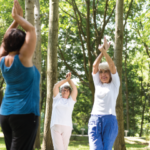Instead, Dr. Katz underscores the need to provide patients with some direction about making incremental changes to their physical activity levels. “Basically, when people hear they need to exercise, they think they need to go to the gym and need to work out hard,” she says. “But I think that giving people something that is approachable and with an attainable goal is good.”
Given that most people have smartphones with activity trackers, she says an easy way to get patients moving more is to counsel them to use such trackers or pedometers to increase their daily steps by minor increments. “Anything helps,” she says.
ad goes here:advert-1
ADVERTISEMENT
SCROLL TO CONTINUE
Mary Beth Nierengarten is a freelance medical journalist based in Minneapolis.
References
- Katz P, Margaretten M, Greogorich S, Trupin L. Physical activity to reduce fatigue in rheumatoid arthritis: A randomized controlled trial. Arthritis Care Res (Hoboken). 2018 Jan;70(1):1–10.
- Katz P, Margaretten M, Trupin L, et al. Role of sleep disturbance, depression, obesity, and physical inactivity in fatigue in rheumatoid arthritis. Arthritis Care Res (Hoboken). 2016 Jan;68(1):81–90.

